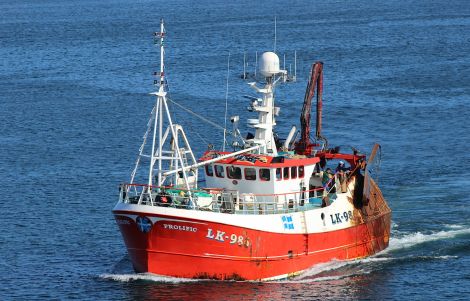News / Challenging times despite quota gains
POLITICIANS and fishing leaders have reacted with a degree of satisfaction to the result of the Brussels quota talks, which are likely to bring a period of stability to the fishing fleet.
The conclusion of the end of year fisheries council was described as “reasonably positive” by the Shetland Fishermen’s Association and the Scottish White Fish Producers’ Association.
But everybody commenting on the issue is warning of the lack of preparation for the whitefish discard ban, which will come into force in January 2016.
In addition to the increases in North Sea cod (five per cent) and haddock (six per cent), already agreed during the EU-Norway talks, total allowable catches (TACs) have been increased for monkfish (20 per cent) and Rockall haddock (113 per cent).
Scottish boats will also benefit from a 50 per cent increase in Greenland halibut and a rollover in the number of days boats can put to sea.
SWFPA Chief executive Mike Park said: “This has been a reasonably positive December Council for fishermen in Scotland.
“At long last the commission is beginning to recognise that the discard ban has created more problems than it has solved.”
SFA chief officer Simon Collins said the discard ban for white fish remains a worry.
“Over and above details of quotas for next year, the commission needs to shoulder its responsibilities on implementing the discard ban.
“Industry has been playing its part with trials and a range of positive suggestions to create a 21st century management regime.
“We welcome the fact that the Scottish Government is taking up these themes with the commission and other member states.
“The commission must now respond with its own positive contribution. Pushing ahead blindly with the failed management systems of the past is not an option.”
Scottish fishing minister Richard Lochhead said: “We have secured increases in eight of our ten most valuable stocks across the North Sea and west of Scotland.
Become a member of Shetland News
“That is good news for the fishing fleet and gives much needed economic stability not just to them, but to our onshore sector and the coastal communities who depend on the jobs the sector provides.
“I am pleased that the need for flexibilities to help prepare for the discard bans in Scotland’s complex fisheries are beginning to be acknowledged.”
Tory Euro MP Ian Duncan added: “Although the newly agreed quotas contain the usual mix of increases and decreases, in the main these fluctuations are manageable.
“This is undoubtedly better news for Scotland’s fishermen and should bring an element of stability to our fleet as we move in to 2015.
“Along with my colleagues on the European Parliament’s fisheries committee, I remain steadfast in my belief that having rules in place to help those fishermen affected by the pelagic discard ban from 1 January 2015 should be a priority.
“Time is on our side for giving guidance to the demersal industry ahead of its own discard ban beginning on 1 January 2016. Getting the rules right and ready for the pelagic fisheries is my New Year’s resolution.”
Become a member of Shetland News
Shetland News is asking its many readers to consider paying for membership to get additional features and services: -
- Remove non-local ads;
- Bookmark posts to read later;
- Exclusive curated weekly newsletter;
- Hide membership messages;
- Comments open for discussion.
If you appreciate what we do and feel strongly about impartial local journalism, then please become a member of Shetland News by either making a single payment, or setting up a monthly, quarterly or yearly subscription.




























































